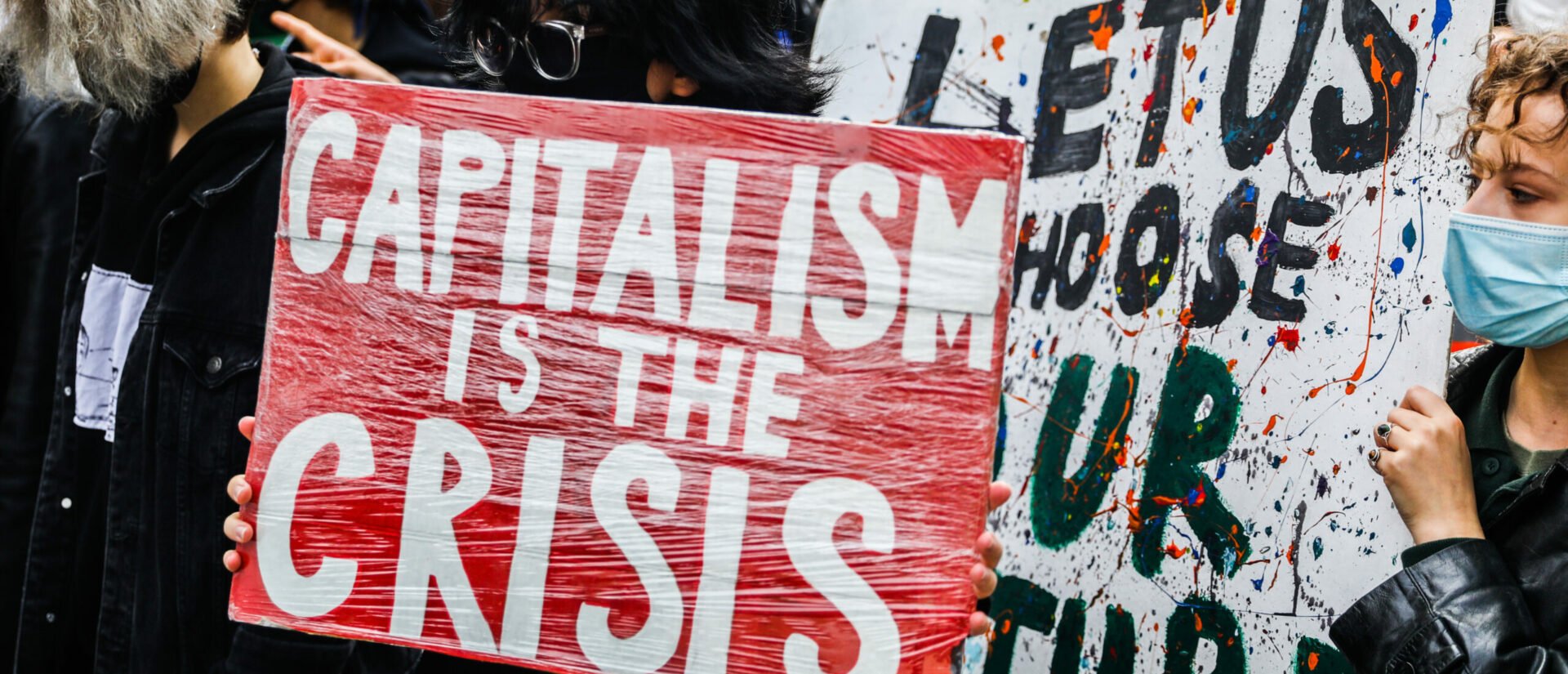
Solving climate change means shifting the “growth at all costs” mentality
Reflections on New York Climate Week
Climate Week has wrapped up in New York, and the takeaways are meagre. Even at the UN Secretary-General’s Climate Ambition Summit(opens in new window) , there was precious little ambition on show. On the contrary, there is still way too much hope – of the ‘head-firmly-in-sand’ variety – that some miracle tech solution will save us, and businesses trying to have their carbon offset cake and eat it. Net zero pledges often mean making someone else pay for the excesses of the wealthy or playing ‘hide the carbon’ in capture and storage(opens in new window) schemes.
Big business is a central player in Climate Week and climate change. SOMO has been investigating multinational corporations (MNCs), their shareholders, and the structures that enable this exploitative system for decades. One thing is increasingly clear: to meaningfully tackle climate change, we must tackle the “growth at all costs” and “maximising shareholder value” mentality that got us into the climate emergency in the first place. If we don’t, we’ll be jumping out of the frying pan (if we can) and into the fire of the next global, corporate greed-caused crisis.
Plundering the planet’s future for profits
My colleague Myriam Vander Stichele noted, after observing Shell’s 2023 AGM, that the problem is out in the open. Against the backdrop of a 10% rise in BP’s share value after the company announced a rollback of its climate ambitions, Shell made clear that renewable energy is simply not profitable enough. They blatantly stated that oil and gas are just better investments for their shareholders. For Shell and other oil majors, it is not that renewables are not profitable; it is that they are not profitable enough.
The implication of oil companies’ focus on shareholder value is the plunder of the global carbon budget. The Intergovernmental Panel on Climate Change (IPCC)(opens in new window) has made clear there is a global carbon budget, and we cannot overspend if we are to keep within 1.5°C of global warming. No one is in control of it. With almost no mandatory requirements in place for businesses that extract hydrocarbons, these companies can plunder the common carbon budget to create wealth for a small group of investors and executives. And that is exactly what they (and a few major OPEC states) are doing. My colleague Rodrigo Fernandez wrote recently that what we are witnessing is “a form of disaster capitalism at its most extreme.”
A global agreement on the carbon budget is likely impossible – the negotiations will take longer than we have. But the home states of the oil giants – the EU, UK and USA – can act unilaterally. In 2021, a Dutch court ordered Shell to lower its emissions by 45%(opens in new window) by 2030 (compared to 2019 levels) – not its emissions in the Netherlands, but globally. Governments can also do this… if they want to, that is. The inevitable bleating about China and global competitiveness should be swept aside for the facile and cowardly nonsense that it is. Should the world burn so that some companies can remain ‘competitive’ in the name of economic growth?
An inequality-driving energy transition
The challenge posed by the growth at all costs and shareholder value mentality is not just an obstacle to reducing greenhouse gas emissions fast enough to avert further disasters, but it is also the most serious barrier to any hope of a just energy transition. The business model underpinning the renewable energy sector is replicating the same patterns of exploitation and inequality that characterised the fossil fuel sector. The model relies on wealthy countries backing their companies to go out and extract the critical minerals needed to power electric vehicles, solar panels, and wind turbines. The EU’s colonial mindset is well to the fore, as it pushes trade and investment agendas on low-income countries that have the lithium, graphite, and cobalt that EU car manufacturers and renewable energy businesses need. China and the US are also driving the competitive exploitation of resource-rich countries, with China well ahead of the game because of its domestic reserves and a lock on processing of key minerals.
Activists globally are red-flagging the problems being caused by the scramble for critical minerals(opens in new window) . Indigenous peoples and marginalised communities are, again, ejected from their land. Pollution of the air, water, and land is, again, the order of the day. Western investors make the same tired promises and then take resource-rich counties for all they can, backed up by their home states. That’s the system. The end product may be ‘green’ to the naïve Global North eye, but the extractive process is as abusive as it has always been. The US and EU(opens in new window) are struggling to put a veneer of social and environmental standards on their stampede for others’ natural resources. It’s not working.
The model we are using for the energy transition has another deeply troubling dimension. The transition is far from universal. There is a massive lack of infrastructure for a renewable energy transition (or just access to energy) in many countries in the Global South. And a huge amount of corporate greenwash about it, which roughly translates as: Here’s our CSR promises so we can convince you to let us get to the profitable minerals, and of course, we’ll support your energy transition, so long as we are subsidised and de-risked up the wazoo.
The Global North and wealthy countries of the East (China, Japan, South Korea) will make the transition, but at what cost? And paid for by whom? There is no way to realise a just energy transition without ending the “maximise shareholder value” corporate mindset that is now completely baked into the process.
What next?
The world needs economic activity, decent livelihoods for all, and good, productive businesses that help meet humanity’s requirements within ecological limits. Low and middle-income countries urgently need a fairer share of income and wealth, as do marginalised people everywhere. What we don’t need is growth for growth’s sake or the relentless pursuit of profit by corporate giants with the connivance of political elites.
The solutions are both radical and not. Many leading economists, academics and activists have put forward clear ideas. From progressive wealth taxes(opens in new window) to ending share buybacks(opens in new window) . Calling for governments to stop supporting car manufacturers making individual vehicles in the Global North and to stop subsidising the fossil fuel industry. All of these can be done. But we have become captured by the myth that acting to control corporate profits will ruin the economy. Emancipation from a destructive idea needs a weight of countervailing voices.
And those countervailing voices are there. And they are becoming louder and stronger. There is a growing body of civic activists, NGOs, and academics working for radical change to the economy and the role of multinational companies. SOMO is proud to count itself among them.
Related news
-
Carbon Offsets: the ‘go-to’ industry for big business greenwashing needsPosted in category:Opinion
 Audrey GaughranPublished on:
Audrey GaughranPublished on: Audrey Gaughran
Audrey Gaughran -
 New study estimates the Netherlands’ fossil fuel subsidies at €37.5 billion per yearPosted in category:News
New study estimates the Netherlands’ fossil fuel subsidies at €37.5 billion per yearPosted in category:News Rodrigo FernandezPublished on:
Rodrigo FernandezPublished on: -
Shell’s extreme brand of disaster capitalismPosted in category:Opinion
 Rodrigo FernandezPublished on:
Rodrigo FernandezPublished on: Rodrigo Fernandez
Rodrigo Fernandez

